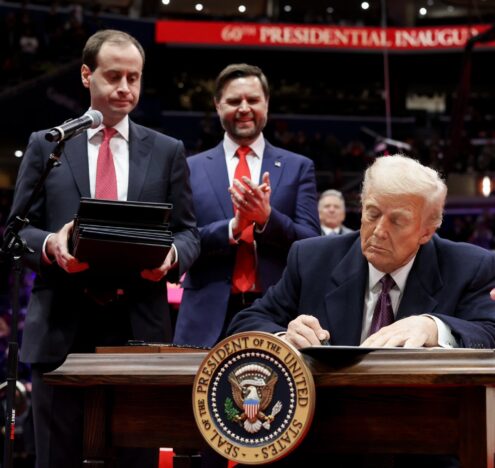America First is back at the ballot box.
Jake Sullivan, President Joe Biden’s National Security Advisor, once described it as “abandoning our core allies, which makes us weaker.” And Biden’s alliance-focused message prevailed in the 2020 election. Until Biden’s withdrawal on July 21st, there looked to be a rematch loading, and the wars in Ukraine and Gaza appeared to be tipping the advantage back in Trump’s favor, which would have meant going back to his foreign policy in the next term.
But Kamala Harris and Tim Walz likely aren’t planning to keep the same Biden national security personnel, and they don’t need to keep the Biden message. If they want to be successful, they should pursue a vision of US foreign policy consistent with a stronger message of freedom, progress and neighborliness — a global Good Neighbor policy.
The “Good Neighbor” Tradition
The Good Neighbor term emerged in the early 20th century, to contrast the long history of US military interventions in Latin America. President Woodrow Wilson promised non-intervention and adopted less hawkish rhetoric, but he found ample opportunity to break his own promises such as with the occupation of Haiti and Nicaragua. A young Franklin Roosevelt was involved with many of these military interventions, but when he took office, he took his old boss’s unkept promise and pursued mutual respect with America’s neighbors. “I would dedicate this nation to the policy of the good neighbor, the neighbor who resolutely respects himself and, because he does so, respects the rights of others,” Roosevelt declared in his 1933 inaugural address.
American troops were withdrawn from Haiti, gunships were replaced by passenger liners and America’s emerging radio and movie networks fostered an inter-American identity. America defended their national interests such as the Panama Canal Zone and several Latin American countries were Allies in World War II. The Good Neighbor policy wasn’t perfect, and despite its signaling it wasn’t a full reprieve from American imperialism — a young Nelson Rockefeller was made Roosevelt’s Latin America czar, conspicuously termed the “CIAA”, helping the FBI arm secret police across the region. Rockefeller’s history with Venezuelan oil foreshadowed the ties between economic exploitation and the American intelligence community, from United Fruit to the Bay of Pigs.
Roosevelt’s Good Neighbor policy wasn’t a new idea. Developed in the debates during the James Monroe administration, Henry Clay’s enthusiasm for an America-led community of republics was met by John Quincy Adams’s refusal to prematurely recognize the South American states. The result was Spain withdrawing from most of the Americas and peacefully ceding Florida to the United States. Later reconciling with Clay’s appointment as his secretary of state, President Adams declared a doctrine dedicated to leading the world by example rather than force. “[America] is the well-wisher to the freedom and independence of all. She is the champion and vindicator only of her own,” John Quincy Adams, said in a speech delivered to the House of Representatives on July 4th, 1821.
The Good Neighbor policy toward Latin America meant, in a sense, “the world” to Roosevelt. Latin America was seen as the United States’s sphere of influence and responsibility, compared to respective European-led spheres. As historian Stephen Wertheim describes, America gradually expanded its perspective to a global power with global prerogatives through the Second World War. Had Roosevelt lived to see VJ day, his peacetime policy may have seen new frontiers.
The Good Neighbor policy did not survive Roosevelt’s succession. In 1954, America overthrew the elected government of Jacobo Arbenz in Guatemala and the Cold War scuttled Latin America’s good will toward the US, which came to be seen not as a neighbor, but an empire. That reputation was not limited to Latin America and outlasted the collapse of the Soviet threat. Despite President Biden’s efforts to end or mitigate foreign commitments, this reputation remains a serious and global problem. Like Roosevelt, Harris has an opportunity to apply an old message more clearly.
A Good Neighbor Policy Today
Kamala Harris co-sponsored the Green New Deal in 2019, combining the enduring legacy of the New Deal with the undeniable significance of the climate crisis. The Biden-Harris Administration fought for this legacy with $20 billion climate grants and historic infrastructure projects reminiscent of the New Deal, but foreign policy hindered rather than helped this vision. Sullivan sought to avoid climate cooperation and “paint Beijing as an outsider on the century’s biggest issue,” with a dual against “autocracies” sidelining global cooperation. A Harris Administration can take a different approach.
A Global Good Neighbor policy can pursue a global network of alliances on the merits of America’s strengths rather than fears about our enemies. It can center solutions to the climate crisis and use that leadership as an asset rather than a competing priority to competition with China. A positive neighborly vision would more effectively build a global network of democracies to oppose autocracy.
Roosevelt’s Good Neighbor Policy existed in a context of horrible imperialism from America’s closest allies, whose colonies bore huge costs through the period. A Global Good Neighbor policy needn’t tolerate racism or bigotry from partners and must forge strong relationships with the global south to enact strong climate-oriented cooperation and democratic integrity. By being invitational rather than oppositional, America will press its democratic advantages relative to autocracies — free societies, cultural diversity and competitive economic opportunity.
“In Minnesota, just like in Wisconsin, we respect our neighbors and the personal choices they make. Even if we wouldn’t make the same choices for ourselves, because we know there’s a golden rule. Mind your own damn business.” Tim Walz said in a speech at a rally in Wisconsin on August 7.
Such a message can be for the foreign policy arena what the Harris-Walz campaign has already successfully done in the domestic policy arena. While past Democrats have been put on the defensive about the use of the government, the Harris-Walz campaign has attacked invasive policies regarding reproductive freedom for Americans. A neighborly “live and let live” approach has driven significant improvements in polling. A Global Good Neighbor policy can similarly combat Donald Trump and JD Vance’s “America First” rhetoric. It’s a necessary shift.
A Global Good Neighbor policy can pursue a global network of alliances on the merits of America’s strengths rather than fears about our enemies.
The hard truth is that Kamala Harris cannot successfully run on Joe Biden’s foreign policy. Biden is on track to end his term at 37% approval for his foreign policy legacy compared to Trump’s 45% or Obama’s 48%. Perhaps that has to do with externalities like Putin’s invasion of Ukraine and Hamas’s October 7 attack, but with both conflicts at a near stalemate for months on end, a uniquely Harris-Walz message is crucial. Luckily, it’s also a powerful message to beat Donald Trump.
An “America first” message has a naturally vindictive edge. By the end of his four year term, Trump’s popularity in foreign allies was dismal — but the gamble was that Americans would, in turn, take a defensive view supporting their president relative to meddling allies. He ended with a less popular foreign policy than Obama. The thrill of “taking back what’s yours” from the international community is fleeting. A neighborhood is a much healthier way to think about an international community.
Roosevelt drew from tradition with his Good Neighbor policy. In approaching the Americas respectfully, with tourism and culture and commerce, he tapped into John Winthrop’s “city upon a hill” and John Quincy Adams’s “well-wisher to the freedom and independence of all.” President Biden ended the 20-year war in Afghanistan but had competing prerogatives that tripped up his alternative to America First. With a Global Good Neighbor policy, the Harris-Walz campaign can ensure that “we’re not going back.”




















